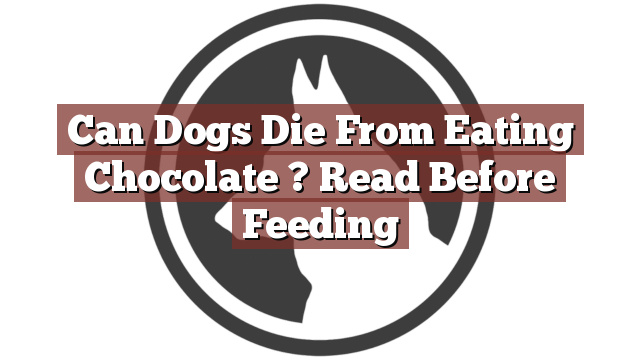Understanding Your Dog’s Dietary Needs
As a responsible pet owner, it is essential to have a clear understanding of your dog’s dietary needs. Dogs have specific nutritional requirements that differ from humans, and it is crucial to provide them with a balanced and appropriate diet to maintain their health and well-being. While dogs can eat many types of food, there are certain items that can be toxic to them. One such food that poses a serious risk to dogs is chocolate.
Can Dogs Die From Eating Chocolate? Read Before Feeding
Can dogs eat chocolate? The answer is a resounding no. Chocolate contains a substance called theobromine, which is toxic to dogs. While humans can metabolize theobromine without any issue, dogs process it much slower, making them vulnerable to its harmful effects. Ingesting even small amounts of chocolate can lead to serious health complications and, in extreme cases, even death.
The severity of the symptoms depends on various factors, including the type and amount of chocolate consumed, as well as the size and sensitivity of the dog. Dark chocolate and baking chocolate contain higher levels of theobromine and are therefore more dangerous than milk chocolate. Symptoms of chocolate poisoning in dogs may include vomiting, diarrhea, rapid breathing, increased heart rate, muscle tremors, seizures, and in severe cases, cardiac arrest.
Pros and Cons of Feeding Chocolate to Dogs
There are no pros to feeding chocolate to dogs. It offers no nutritional value to them and only poses a significant health risk. Chocolate poisoning can lead to serious complications and, in some cases, irreversible damage to vital organs. It is important to remember that prevention is always better than treatment when it comes to your dog’s health.
While the thought of sharing your favorite treat with your furry friend might be tempting, it is crucial to resist the urge. Instead, opt for dog-friendly treats specifically formulated for their nutritional needs. If you suspect your dog has ingested chocolate or is showing any symptoms of chocolate poisoning, it is imperative to seek immediate veterinary attention.
In Conclusion: Prioritize Your Dog’s Health and Avoid Chocolate
To ensure the well-being and longevity of our beloved canine companions, we must prioritize their health. This means being vigilant about what they eat and avoiding foods that are potentially harmful or toxic to them. Chocolate, with its theobromine content, is unquestionably one such food that should never be fed to dogs. While it may be difficult to resist those pleading eyes, remember that your dog’s health and safety are paramount. Stick to a balanced and appropriate diet, and choose treats that are specially formulated for dogs. By doing so, you can enjoy many happy and healthy years together with your four-legged friend.
Thank you for taking the time to read through our exploration of [page_title]. As every dog lover knows, our furry friends have unique dietary needs and responses, often varying from one canine to another. This is why it's paramount to approach any changes in their diet with caution and knowledge.
Before introducing any new treats or making alterations to your dog's diet based on our insights, it's crucial to consult with a veterinarian about [page_title]. Their expertise ensures that the choices you make are well-suited to your particular pet's health and well-being.
Even seemingly harmless foods can sometimes lead to allergic reactions or digestive issues, which is why monitoring your dog after introducing any new food item is essential.
The content provided here on [page_title] is crafted with care, thorough research, and a genuine love for dogs. Nevertheless, it serves as a general guideline and should not be considered a substitute for professional veterinary advice.
Always prioritize the expert insights of your veterinarian, and remember that the health and happiness of your furry companion come first.
May your journey with your pet continue to be filled with joy, love, and safe culinary adventures. Happy reading, and even happier snacking for your canine friend!

